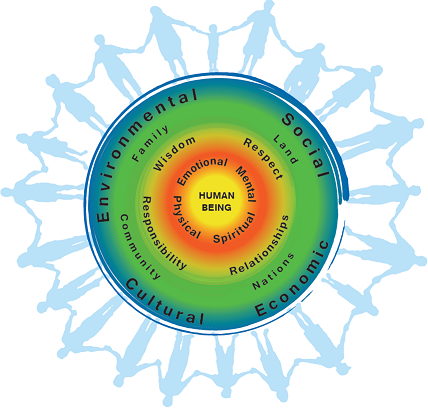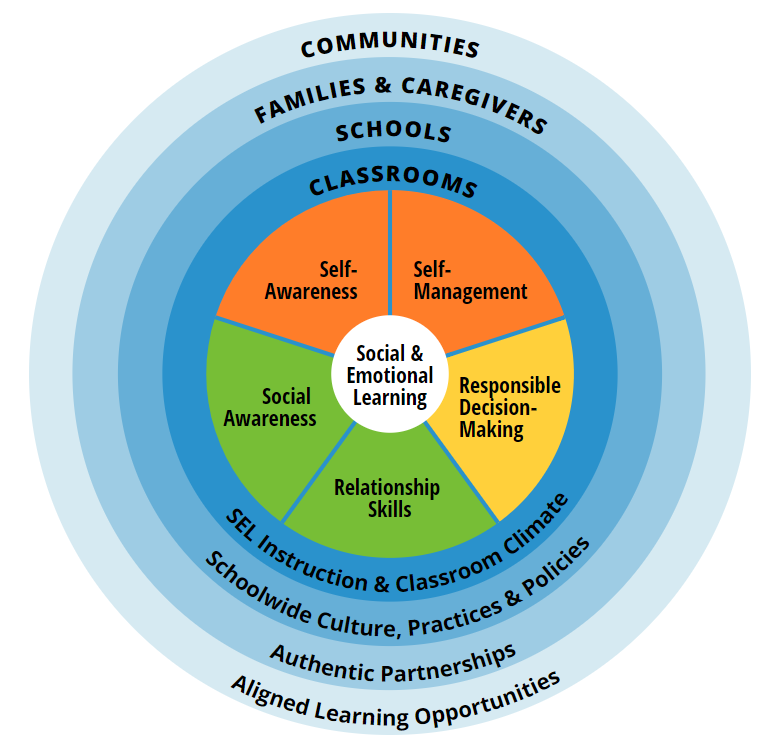
What do kindness, determination and relationship skills have in common? They are all part of your child’s social and emotional development.
Social and emotional development (SED) is an important part of your child’s development and well-being. It is how your child learns the social and emotional skills that help them to thrive throughout their life. In some settings, such as schools, SED may be called social and emotional learning.
SED skills include:
- expressing and managing emotions (emotional regulation)
- being kind and having compassion
- being aware of their own strengths and challenges
- getting along with others and solving problems effectively
- bouncing back after a setback (resilience)
Well-being and social & emotional development
Well-being is the experience of feeling comfortable, happy and healthy. You can support your child’s overall well-being by nurturing them emotionally, mentally, spiritually and physically. Some examples of positive well-being include having safe and caring relationships, a sense of purpose or meaning, and generally feeling happy with life.
Below is an image of the First Nations Perspective on Health and Wellness. It is a tool that can be used by all parents and caregivers to understand well-being as a whole. SED skills are in the second circle. For example, the social and emotional skill of getting along with others (second circle) supports one of the core values of relationships (third circle). You can learn more about the First Nation's Health Authority's First Nations Perspective on Health and Wellness here.

You can also learn more about Indigenous approaches to well-being and SED by checking out the Family Connections booklet for parents and caregivers. It has information on bonding and how to form secure attachments with your child. It also explains how and why it is important to connect with extended family and community.
SED skills add to your child’s positive well-being and help them cope with life’s challenges. These skills promote well-being and act as protective factors for your child by decreasing the chances of having mental health challenges or making them less severe.
SED skills can help your child:
- develop self-awareness and know when they are experiencing a big feeling
- have the words to tell others when these big feelings happen
- know ways to bounce back and get through challenges (For example: rebuilding a block tower or moving to a new city)
- have tools to pick themselves up when they experience low energy and to settle themselves when they experience high energy (self-regulate)
SED skills will support your child through all aspects of life. They will help them to build and maintain their relationships, cope with tough times, and gain an awareness of the world around them.
Understanding social & emotional development
It can be helpful to group SED into categories to better understand the type of skills that children and youth develop. The CASEL framework is one way of thinking about the areas of SED. CASEL stands for “Collaborative for Social, Emotional and Academic Learning.” This framework is used in BC schools.
CASEL framework’s five areas of SED skills with examples:
- Self-Awareness. Knowing what we are good at and what areas to improve; being able to identify how we are feeling; and developing a sense of purpose.
Self-Management. Knowing how to settle ourselves when we have big feelings; picking ourselves up after a setback; and how to work towards our goals.
Social Awareness. Being able to take the perspective of someone else; understanding that others may have feelings different than our own; and showing kindness towards others.
Relationship Skills. Knowing how to make friends; being able to solve problems with others; and having effective communication skills.
Responsible Decision Making. Being able to look at social issues from many sides; understanding how our behaviour and decisions impact the larger community; and being aware of global issues such as climate change.

You can find more information about CASEL here.
Supporting your child’s social & emotional growth
Children go through different stages of social and emotional development as they grow. In each stage, there are tasks and ways you can support their development. It is important to remember that these stages are guidelines. No two children will move through these stages in exactly the same way.
If you are concerned about your child’s social and emotional development, you can talk with a health professional, your child’s teacher, or other childcare specialists.
Age
|
Examples of SED tasks
|
Ways to support SED at home
|
Infancy (0 to 18 months) |
|
|
Toddler (18 months to 4 years) |
|
|
Primary Grades (5 to 8 years) |
|
|
Intermediate Grades (9 to 12 years) |
|
|
Adolescents (13 to 17 years)
|
|
|
Young Adults (18 to 24 years)
|
|
|
Social & emotional development in other settings
You have many partners that support your child’s social and emotional development including schools, after-school programs, daycares and other childcare programs. One important way they support SED is by creating a safe place where children can take risks, explore new skills and make mistakes that are met with compassion and gentle guidance.
A few ways you can work together to support your child’s SED:
- Learn more about your child’s social and emotional learning. If you are curious about how your child’s SED is nurtured in these settings, talk to the school or program staff.
- Consider using the same language and resources at home. For example, your child’s school may be using the CASEL framework to teach SED skills. Or, if your child’s daycare is using a feeling words chart, you can use the same one at home (the daycare may even have an extra copy to give you!).
- Access parenting resources. Many social and emotional learning programs that are used in classroom and childcare settings also have online parent resources. You can ask if there are parent resources that go with the program and how you can access them.
Working with your child’s school and childcare teams means your child:
- hears the same language at home and school
- receives the same message at home and school that their social and emotional world is important
- experiences environments that are consistent and predictable that enable your child to feel safe
Supporting your child with their SED skills can help them be more confident and resilient. Your child will continue to develop these skills throughout their life. As a caregiver, you are also still on a journey of learning and practicing your own SED skills alongside your child. Consider reflecting on this shared learning together, as a way to connect and validate their experience.



